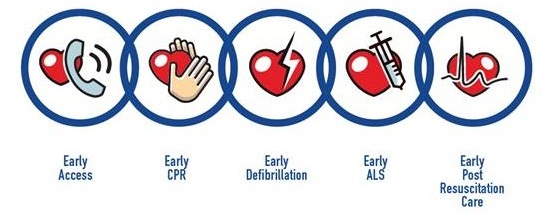Citizen CPR
Every year in Ireland almost 5,000 people die from sudden cardiac arrest. Most sudden cardiac arrests occur outside of hospital and death occurs within a few minutes if treatment is not started.
Survival from cardiac arrest has improved over recent years and the most recent out-of-hospital cardiac arrest register report shows that there has been an increase in survival to 6.4% for sudden out-of-hospital cardiac arrest patients.
There has also been yearly increases in the number of patients receiving bystander CPR, within minutes of the patient experiencing the cardiac arrest, with a 9% increase described in the most recent report.
From the moment of collapse, the chance of survival decreases by 7-10% per minute when CPR is not being performed. Hesitation costs lives.
About CPR
CPR is a life-saving technique performed on a person whose heart has stopped beating and is not breathing. CPR manually pushes oxygen into the lungs so that it can go to the brain and keep the person alive.
There are two types of CPR:
- Traditional CPR which involves giving chest compressions and rescue breaths to the person
- Compression-only CPR involves giving chest compressions only to the person
In order to master effective CPR skills, you must attend a Cardiac First Response (CFR) course which is recognised by PHECC or the Irish Heart Foundation (IHF). To find a CFR course in your area please click
here.
Early access to help, early CPR, early defibrillation and early advance life support are the important links in the chain of survival in sudden out-of-hospital cardiac arrest. You can make a difference.

If you see someone collapse, who is unresponsive and not breathing, they will still have oxygen-rich blood in their body – you are the link in the chain that will make a difference to their survival.
The key thing to remember when administering CPR is to keep compressing the chest until trained emergency medical personnel take over from you.
To read the most recent out-of-hospital cardiac arrest register (OHCAR) report please click
here and see some key message from the report
here.